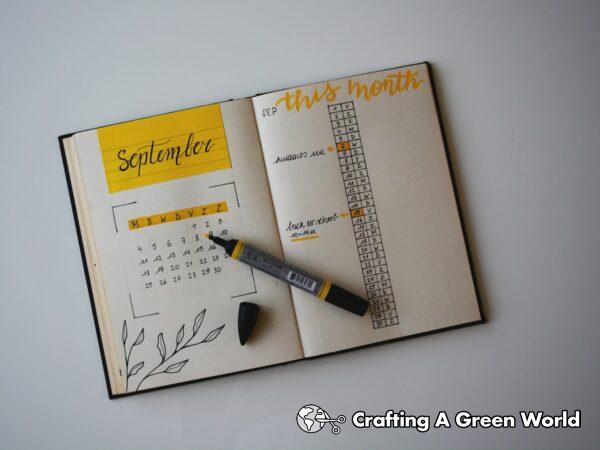Embarking on a 12-step journaling journey is a terrific pathway towards self-discovery and introspection. By working through these specially curated prompts, you can potentially unlock versatile forms of creativity, deep introspection, and the undiluted joy of written expression.
In this article, we’re more than excited to share with you a compendium of stimulating 12-step journal prompts. Whether you’re seeking to uncover layers of self-understanding, desire clearer insights into the world, or simply find tranquility through the act of writing, our meticulously chosen prompts are here to steer your explorations.
So, get ready to turn the page, pull out your favorite pen, and let’s delve into an enriching journey of self-expression and creativity together! 🤗
Focused Reflective Questions
Incorporating Focused Reflective Questions in your 12-step journal prompts encourages deep introspection and self-analysis, aiding in the transformative journey. Here are 20 Focused Reflective Questions worth considering:
- What was the most challenging part of your day, and why?
- Write about a decision you made that had a significant impact on your life. Do you still stand by that decision?
- Describe a special moment or interaction that made you smile today.
- Discuss any emotional barriers that hold you back from achieving your goals.
- Imagine your best self – what does it look like? What steps can you take to get there?
- Are there any unresolved issues that continue to bother you? How might you resolve them?
- What was your proudest achievement this week, and why was it significant?
- What actions can you take to solidify your connection with others?
- If you could change one thing about your past, what would it be and why?
- Reflect on a recent failure – what lessons did you learn from it?
- What are some negative thoughts you often struggle with? How can you challenge them?
- Discuss a key relationship in your life and how it's shaped you.
- How does your present situation align with your future goals?
- What steps can you take to become more present in your daily life?
- Reflect on a fear that holds you back, and explore ways you can overcome it.
- Identify something you did that was out of your comfort zone and its outcome.
- In what ways do you demonstrate self-care and its impact on your wellbeing?
- Discuss an experience that challenged your perspective on an important issue.
- Reflect on an area in your life that shows significant growth or change.
- What's a personal value you hold dear and how do you enact it daily?
Identifying Triggers
In the process of 12-step journaling, Identifying Triggers offers the opportunity to explore and recognize the environmental, emotional, or physical cues that may lead to unhelpful behaviors or thoughts. Here are 20 prompts geared to aid you in pinpointing your triggers:
- Describe a situation recently where you felt a sudden shift in mood. What were the external factors involved?
- Write about an instance where you reacted impulsively. What event preceded your reaction?
- Note down an emotional response you had today. Can you trace it back to a specific trigger?
- Reflect on a memory that consistently brings up strong emotions for you.
- Draft a list of three physical sensations you often experience before feeling stressed or anxious.
- Record a conversation which left you feeling upset. What phrases or attitudes triggered your emotional response?
- Dissect an episode of unhealthy behavior. What event did it follow?
- Write about a place or environment that makes you feel uncomfortable. What elements contribute to your discomfort?
- Detail an interaction that left you feeling emotionally drained. What was the trigger within this interaction?
- Examine a time you wanted to break a habit or commitment. What provocation did you encounter?
- Describe a sensation you experience when encountering something that scares you.
- Write about an event that led you to feel exceptionally happy. What triggered this sensation?
- Reflect on a smell or taste that immediately transports you to a specific memory. What feelings are associated with it?
- Note down a sound that results in a strong emotional response. How does it make you feel?
- List any specific words or phrases that trigger a negative emotional response in you.
- Recall a movie, song or book that has a profound emotional influence on you. What emotions does it bring out?
- Write about a personal or work-related scenario that consistently causes stress. What about it induces stress?
- Reflect on a time when you were reminded of a traumatic event from your past. What sparked this memory?
- Observe a particular time of day that often makes you feel a certain way. Can you identify why?
- Describe a piece of news or information that stirred intense emotion in you. What triggered these feelings?
Embracing Acceptance
Embracing acceptance in our lives through journaling can cultivate a profound understanding of our thoughts, feelings, and actions, thereby promoting inner peace and personal growth. Here are 20 prompts to inspire your journey towards acceptance:
- Write about a moment when you struggled to accept something. What did it teach you?
- Reflect on a situation you have come to accept recently. How has this acceptance influenced your perspective?
- Describe a time when someone else accepted you wholeheartedly despite your flaws.
- Consider an aspect about yourself you need to accept. How can acceptance change your perceptions?
- Write about someone you need to accept as they are, without judgement or resentment.
- Recall a time when acceptance helped heal a wound in your life. What did that process feel like?
- Jot down three daily affirmations to foster self-acceptance.
- Envision a scenario where acceptance was the key to problem resolution.
- Describe a moment when acceptance played a crucial role in your relationship with someone else.
- Imagine an aspect of your life is a boat in a river. Write about how acceptance can be the current that moves it forward.
- Recognize and write about a mistake for which you are still seeking self-acceptance.
- Recall a moment you accepted failure. How did that acceptance impact your future efforts?
- Write a letter to your younger self about the importance of self-acceptance.
- Reflect on a habit or trait of yours that was initially difficult to accept but is now part of your identity.
- Imagine a scenario where judgement was replaced with acceptance. How did it change the situation?
- Describe how accepting your fears and acknowledging them can result in personal growth.
- Write about a time when acceptance brought you peace and contentment.
- Consider a significant life change you've made. How did acceptance play a role in this transition?
- Reflect on what acceptance means to you in your relationships with others.
- Write about an aspect of your physical appearance that you have grown to accept and appreciate.
Road To Recovery
Navigating the path of recovery through 12-step journal prompts can help bring clarity and positivity in overcoming personal challenges. The following are 20 prompts to spark inner growth and self-reflection on your road to recovery:
- Describe an emotional roadblock in your recovery journey. How can you overcome it?
- Write about your biggest accomplishment in recovery thus far.
- Share a turning point in your recovery journey.
- Express any fears you may have about staying sober and how you plan to address them.
- Jot down three affirmations that reinforce your commitment to recovery.
- Reflect on any lessons learned from past relapses or setbacks.
- Chronicle the ways your life has improved since starting the recovery process.
- Pen a letter to your past self before recovery. What would you want to convey?
- Identify three people who have been pillars of support in your recovery.
- Contemplate any negative assumptions you had about recovery before starting the journey.
- Write about a dream or goal that feels more accessible now that you’re in recovery.
- Describe a moment of self-forgiveness on your recovery journey.
- Note down three coping strategies that have been effective for you.
- Reflect on a time when you felt proud to be on the road to recovery.
- Discuss the most unexpected benefit you've noticed since your recovery began.
- Write down five things you’d like to say to someone who is contemplating recovery.
- Imagine your life five years into recovery. What would it look like?
- What is a common misconception about recovery that you would address?
- Describe a moment that tested your commitment to recovery and how you overcame it.
- Write a gratitude list for the benefits recovery has brought into your life.
Power Of Surrender Inventory
Journaling about the Power of Surrender Inventory aids in recognizing actions and attitudes that need release, promoting emotional growth and recovery. Here are 20 thought-provoking prompts.
- Write about a situation in which you held onto control too tightly. What was the outcome?
- Jot down three things you're hanging onto that are no longer serving you. How might surrendering them change your life?
- Describe a time you surrendered control and the situation improved.
- List five areas of your life where you struggle to let go. Why do you think that is?
- Brainstorm the benefits of surrendering control in challenging situations.
- Reflect on a moment when you felt liberated by letting go. How did that feel?
- Write about a recurring issue you're faced with. What might happen if you stopped trying to control the outcome?
- Identify three attitudes you've held that have caused pain or unhappiness. How can you release them?
- Reflect on a time when someone else's surrender had a positive impact on you.
- Imagine a scenario where surrendering control could adverse consequences. How could you manage this?
- Write about the fears that hold you back from letting go.
- List three things that letting go could open up for you.
- Recall how surrender has played a role in your recovery journey so far.
- Sketch out what true surrender might look like in your life.
- Explore the role trust plays in your ability to surrender.
- Reflect on a relationship that could benefit from you releasing your need for control.
- Write about your habits that prevent you from letting go. How can they be transformed?
- List signs that suggest it's time to surrender control in a situation.
- Consider ways your life could change if you embraced the Power of Surrender Inventory.
- Reflect on the concept of surrender. How does it relate to the concept of power in your life?
Spiritual Awakening
Spiritual Awakening within the context of 12-step journal prompts serves as a means to increase self-awareness and connection to a higher purpose. Here are 20 writing prompts to aid you with your Spiritual Awakening:
- Jot down a moment when you felt profoundly connected to something larger than yourself.
- Write about an experience that shifted your perspective about life.
- Reflect on a time you felt a strong feeling of empathy. How did that member your sense of self?
- What values do you hold close in your life? Why are these important for your spiritual journey?
- Detail a dream that you found spiritually enlightening.
- Write a person you've never met but feel a spiritual connection with. Why do you feel connected to them?
- Explore a moment when you felt your most peaceful. Where were you and what were you doing?
- Reflect on a quote or mantra that resonates with your spiritual path.
- Describe an art piece (book, movie, painting, etc.) that moved you spiritually.
- Write about a spiritual goal you want to achieve. Why is this important to you?
- Discuss the challenges you've encountered on your spiritual journey.
- Describe a moment when you experienced spiritual growth. What incited this growth?
- List three things you're grateful for today and how these blessings make you feel.
- Write about a kindness someone showed you and how it affected your perspective.
- Reflect on a lesson you learned that you believe was a divine intervention.
- Write a letter to your future self. What spiritual wisdom or advice would you like to impart?
- Think about a habit you want to change to foster your spiritual development.
- Reflect on the concept of forgiveness and what it means in your spiritual journey.
- Write about any fears or reservations you have regarding your spiritual path.
- End with positive affirmations that align with your spiritual goals.
Alleviating Guilt & Shame
Addressing guilt and shame through journaling can be a cathartic process, enabling us to confront deep-seated feelings and transform them into steps towards healing and self-discovery. Below are 20 guilt and shame centered prompts to include in your 12-step journal writing:
- Write down an instance where you experienced guilt. How did it manifest in your behavior?
- Describe a moment when you felt shameful. What triggered this feeling?
- Think of an action or decision that made you feel guilty. How could it be handled differently?
- Identify a time when shame influenced your actions. How can you learn from this?
- Write a letter forgiving yourself for something you feel guilty about.
- List three ways in which you can transform a past regret into a positive action.
- Chronicle a shame-based thought you often have. Can you identify where it originates?
- Write about a time you made amends for something you felt guilty about.
- Describe the steps you've taken to overcome shame in your life.
- Think about a conversation you would have with your younger self about an event you feel guilty about.
- Note down something you've been holding onto out of guilt. How can you begin to release it?
- Write a letter to someone you hurt, expressing your remorse and the changes you have made since then.
- Identify a recurring theme in the instances you feel guilty; how can you address this?
- Think about a moment when you felt shame but chose to push through it anyway. How did this make you feel?
- Dialog with a part of yourself burdened with shame. What would it say to you?
- Reflect on guilt as a learning experience. What lessons have you learned?
- Write about a future where guilt and shame aren't as influential in your decisions.
- Identify 3 positive things you can do today to alleviate a guilt-ridden feeling.
- Document a time when you faced a shame-inducing situation and how you overcame it.
- Write a commitment letter to yourself stating how you will deal with guilt and shame moving forward.
Personal Inventory Check
Incorporating a Personal Inventory Check into your 12-step journal prompts encourages self-reflection, growth, and awareness of your habits and behaviors. Here are 20 prompts that can guide you in this thoughtful self-exploration:
- Reflect on the positive changes you have witnessed in your life recently. What spurred these changes?
- Identify a habit that you think needs critical review and modification.
- Consider a situation when you could've controlled your anger better. How would you react if faced with a similar situation now?
- Draft an honest self-evaluation citing your strengths and areas you need to work on.
- Write about an instance where you’ve been brave. How did it make you feel?
- Reflect on a habit or behavior you've given up, which was not serving your personal growth.
- Write down three personal characteristics you're really proud of.
- Identify a recurring theme in your thoughts, emotions, or reactions that you’d like to change.
- Write about an experience where you faced a moral dilemma. How did you handle it?
- Describe a scenario when you were particularly self-supportive. How can this serve as a model for future situations?
- Identify an aspect of your personal life that needs attention and improvement.
- Reflect on your emotional health. Are there feelings or emotions you think you should pay more attention to?
- Write about an occasion when you went beyond your comfort zone. How did that make you feel?
- List and evaluate three decisions you've made recently.
- Identify a positive quality you want to develop more.
- Write about an instance when you honored your own needs instead of complying with external pressure.
- Reflect on a relationship which has undergone significant transformation. Did it bring you better understanding or more confusion?
- Identify three things you can do this week to improve your emotional well-being.
- Write about a time when you've been truly honest with yourself. What was the result?
- Consider a moment when you were not afraid to express your vulnerability. How did this openness impact you and your relationships?
Adornments Of Self-forgiveness
Adornments of Self-Forgiveness within journaling encourage us to cultivate personal absolution, healing from past hurts and fostering growth in self-love. Delve into the following 20 prompts focusing on the theme of self-forgiveness:
- Write about a mistake you made in the past that you have trouble forgiving yourself for.
- Identify three positive things you learned from this mistake and how they helped shape you today.
- Describe a time when you had to forgive someone else. How did it make you feel?
- Reflect on the barriers you face in forgiving yourself. Why do you think they exist?
- Write a letter of forgiveness to yourself for a past mistake.
- Identify an area in your life you would like to improve and describe how forgiving yourself is a necessary step.
- Visualize a future where you have forgiven yourself. How has this affected your overall happiness?
- Think about a negative self-belief you hold. How can self-forgiveness challenge this belief?
- Reflect on the kindest thing you've ever done for yourself. Could you show the same kindness in forgiving yourself?
- Pinpoint a time when you were too hard on yourself. How can self-forgiveness change this narrative?
- Describe the feelings you experience when you think about forgiving yourself.
- Write a letter to your past self, offering the gift of forgiveness.
- Identify how self-forgiveness can impact the relationships in your life.
- Reflect on any guilt you currently carry. How could forgiving yourself ease this burden?
- Write about a time when you successfully forgave yourself and how it felt.
- Visualize how self-forgiveness may positively impact your self-confidence.
- Recall an occasion when you did not forgive yourself. How did this decision influence your future actions?
- Think about someone you admire. What qualities of self-forgiveness do they embody?
- Imagine the person you aspire to be. How does self-forgiveness play a role in becoming this person?
- Identify three steps you will take towards self-forgiveness in the coming weeks.
Overcoming Resentments
Overcoming resentments through the process of journaling aids in self-discovery, forgiveness, and personal growth, thus timing down the hinderances in achieving serenity. Here are the 20 prompts that could facilitate your journey towards overcoming resentments:
- Highlight an instance when you felt resentful. What were the circumstances?
- Describe an emotion you felt when you were carrying resentment. Why do you think you felt that way?
- Reflect on how your resentment impacted your relationship with the person involved.
- Discuss a recurring resentment and why you think it continues to appear in your life.
- What is a lesson that resentment has taught you in the past?
- Identify three different coping mechanisms you have used when grappling with resentment.
- Write about a resentment you've managed to overcome. What steps did you take and how did you feel afterwards?
- Think of a time when you felt resentment was justified. Do you think the same now?
- Discuss a resentment you're ready to let go of, and outline why.
- Write a forgiveness letter to the person you have resentment towards. What would you want them to understand?
- Describe how resentment has affected your mental and emotional wellbeing.
- Write out any fears you have about letting go of your resentments.
- Reflect on ways in which holding onto resentments have shaped your personality.
- Draw parallels between past and present resentments. Are there any common themes?
- Write about what you would change if you had the power to rewrite your past resentments.
- List three practical steps you plan to take in order to let go of your resentments.
- Write a positive affirmation you could repeat to yourself when you start feeling resentful.
- Describe the person you believe you could be without the burden of resentment.
- Reflect on past mistakes you made out of resentment. What would you do differently now?
- Imagine how freeing yourself from resentment will improve your life and write a journal entry from this future perspective.
Connecting With A Higher Power
Connecting with a Higher Power through journaling nourishes our spiritual well-being and enriches our faith, anchoring us in a securer self-identity. Here are 20 prompts to facilitate this divine connection in your 12-step journal routine:
- Write about a moment where you felt a strong connection with your Higher Power. What ignited these feelings?
- In what ways do you feel your Higher Power speaks to you?
- Compose a prayer or letter to your Higher Power asking for guidance.
- Describe a time when you felt distant from your Higher Power. How did you navigate this experience?
- Write about the qualities you appreciate about your Higher Power.
- Muse upon a situation where you believe your Higher Power intervened, guiding you toward a better outcome.
- Express gratitude to your Higher Power for the strength it provides.
- Write about a challenge where you are seeking help or guidance from your Higher Power.
- Reflect on what surrender means to you in your journey towards connecting with your Higher Power.
- How can you hone your spiritual listening skills to better hear your Higher Power?
- Freewrite for five minutes about the immediate feelings you have towards your Higher Power.
- Write about a moment when you experienced deep serenity or peace. How does this relate to your Higher Power?
- Script a conversation with your Higher Power discussing your fears and doubts.
- Discuss a moment of growth you've experienced and how this has impacted your relationship with your Higher Power.
- Scribe a note to your future self about the importance of maintaining a strong bond with your Higher Power.
- Document the personal symbols or signs which make you feel connected to your Higher Power.
- Write about a blessing or miracle you believe your Higher Power provided.
- Describe a time where your faith was tested, and how your Higher Power helped you endure.
- Capture your current feelings towards your spiritual journey in a poem or song.
- Write about a scripture or spiritual text that significantly influences your connection with your Higher Power.
Maintaining Continual Growth
Maintaining continual growth with 12-step journal prompts enables us to cultivate self-development, progress towards our goals and incremental expansion beyond our current capabilities. Here are 20 prompts to assist you in nourishing constant growth via your journal practice:
- Write about an area in your life where you'd like to see growth. What does that look like?
- List three small steps you could take towards personal growth today.
- Reflect on a recent challenge. What did you learn from it, and how could you use that lesson to facilitate growth?
- Envision your ideal self in one year's time. What has changed?
- Brainstorm ways to step outside of your comfort zone this week.
- Create a growth action plan for a specific skill you want to enhance.
- Describe a time when you experienced significant personal growth.
- Identify three strengths you currently possess, and explore new ways to leverage them.
- Write a letter to your future self, encouraging continual growth.
- Reflect on a mindset or habit you'd like to change. How would this change foster growth?
- Journal about a person who embodies the type of growth you aspire to. What qualities do they possess?
- List five books or resources that could aid in your personal growth journey.
- Reflect on an area where you've remained stagnant. What's been stopping you from growing?
- Document your growth progress at the end of every week. Note any areas of improvement.
- Write about a person who has impacted your growth. How did they contribute to your development?
- Identify a fear that's hindering your growth and explore ways to overcome it.
- Discuss a goal you achieved and how the process of reaching it fostered personal growth.
- Write about something new you learned recently and how it can be incorporated into your growth journey.
- List three people who motivate you to continue growing, and explain why.
- At the end of each month, reflect on and acknowledge your overall growth.
The Impact Of Making Amends
Unraveling the impact of making amends can be truly transformative on the journey of recovery and growth. Here are 20 thought-provoking prompts you can use to explore this concept in your journal:
- Reflect on an instance where you made amends with someone. How did it impact your relationship?
- Write about an occasion when you had difficulty making amends. Why was it challenging?
- Describe a situation where someone made amends with you. How did their actions make you feel?
- In what ways could you make amends for an old grudge you are still carrying?
- Imagine writing a letter of apology to someone you've wronged – what would you say?
- Write about a time when you regretted not making amends. What held you back?
- Can you identify a recurring theme in the situations where you felt the need to make amends?
- Some hurts can't be reversed but can be apologized for. Write about such an instance in your life.
- Visualize a situation where you can achieve closure by making amends – how would this change your life?
- Explore your thoughts and feelings about receiving an unexpected apology from a past conflict.
- Think of a relationship from your past that requires amends. How can you approach this delicately and respectfully?
- Forge a detailed plan to make amends with someone close to you who you've hurt.
- Write about the anxiety or fear that may come with the thought of making amends and how to combat this.
- Recall an instance when making amends brought you relief. What brought about this feeling?
- Explore the potential outcomes of making amends in a currently strained relationship.
- Write a letter of forgiveness to someone, even if you may never send it.
- How have you grown as a person through the process of making amends?
- Reflect on how you've overcome pride or ego to make amends in past instances.
- Write about your fears of the possible outcomes of making amends in a particular situation.
- Look back on your journey of making amends and write about how it has contributed to your journey of recovery.
A New Vision Of You
Challenging the existing perceptions of oneself through journaling can harness personal growth and self-understanding, paving a path towards an evolved version of you. Here are 20 stimulating journal prompts about envisaging a new version of yourself:
- Write about a trait you would like the 'new you' to adopt. Why this trait?
- Visualize yourself a year from now, what three things have changed?
- Describe a behavior or a habit that the 'new you' has successfully stopped.
- What triggers, if any, should the 'new you' learn to manage better?
- Proclaim an accomplishment that the 'new you' has achieved.
- List the top five values the 'new you' prioritizes.
- What are three new coping strategies the 'new you' might implement?
- How does the 'new you' handle failure?
- Write a compassionate letter from the 'new you' to your present self.
- What habit, that you don't have currently, does the 'new you' practice daily?
- Describe a day in the life of the 'new you'.
- How has the 'new you' improved relationships with friends, family, or colleagues?
- What's a bold step the 'new you' has taken that you haven't yet?
- Discuss a time where the 'new you' faced a fear that currently holds you back.
- How does the 'new you' maintain mental and physical health balance?
- Share how the 'new you' approach and react to stress or crisis.
- Reveal a random act of kindness the 'new you' has done.
- How does the 'new you' self-reflect and ensure continual growth?
- What are some ways the 'new you' nurtures personal interests and hobbies?
- Lastly, detail the personal mantra the 'new you' lives by. Why this mantra?
Embracing Serenity And Gratitude
Embracing serenity and gratitude through journaling promotes inner peace and thankfulness, strengthening our appreciation of life's daily blessings. Here are 20 prompts to aid you in cultivating serenity and gratitude:
- Recall a recent moment of serenity you experienced. What sparked it?
- Write about a situation where you felt deeply grateful. What invoked such gratitude?
- Sketch out an ideal serene day. What would it encompass?
- List five things you are grateful for today.
- Think about a time you felt peace amidst chaos. Write about how you achieved that serenity.
- Reflect on a moment where an act of kindness triggered your gratitude.
- Write a letter to someone who brought you peace. What would you like to tell them?
- Consider a goal that has recently been fulfilled. How does that achievement make you feel grateful?
- Describe how you can cultivate more serenity in your life.
- Write about the biggest lessons you have learned from experiences that made you grateful.
- Recall a physical place that brings you peace. Describe it in detail.
- Note down three skills or talents you possess that you are grateful for.
- Specify an upcoming event or moment that you are looking forward to experiencing serenity.
- Consider a personal quality of yours that you are appreciative of.
- Write a thank you letter to an object that brings you comfort and peace.
- Reflect on an event that caused a paradigm shift, making you more grateful for what you have.
- Draft a plan with steps to actively create peaceful moments in your everyday routine.
- Write about someone you’re thankful for and explain why.
- Narrate a past experience that made you appreciate the little comforts of life.
- Reflect on the qualities or habits that you believe have contributed to cultivating peace and serenity in your life.
Dealing With Denial
In the process of self-discovery and healing, confronting denial through journaling introspection can be a powerful tool in fostering honesty, self-awareness, and progress. Here are 20 journal prompts designed to help you delve into and unpack the concept of denial:
- Write about a situation where you believe you might have been in denial. Why do you think you chose not to acknowledge the issue?
- Describe a time when you recognized your denial only in retrospect. What led you to that realization?
- Jot down events or comments that others have stated you're in denial about. Are you able to see their perspective?
- Examine a recurring problem in your life. Is there an aspect of it you might be denying?
- Reflect on a belief you once strongly held but have since abandoned. Was denial involved in your initial belief?
- Describe instances where you've felt defensive when someone brought up a topic. Might denial be a factor in your reaction?
- Outline three areas where you may have experienced denial in the past week. What were these about?
- List reasons why you think people engage in denial. Are any of these reasons applicable to you?
- Write about how denial has influenced your relationships with others.
- Explore the idea of denial in relation to self-care. Have you ever neglected self-care due to denial?
- Think about a challenging situation in your life. How could denial make it harder or easier to deal with?
- Write a letter to yourself addressing an issue that you've been denying.
- What emotions does the concept of denial bring up for you? Write freely about these feelings.
- Recall a story from your childhood where you remember being in denial about something.
- Explore denial and its relation to fear. What fears might denial protect you from?
- Draft a plan for confronting denial in one area of your life.
- Describe a circumstance where acknowledgement instead of denial led you to a moment of personal growth.
- Identify the signs that might tell you when you're engaging in denial.
- Journal about your understanding of the connection between denial and reality distortion.
- Lastly, write a note of encouragement for yourself for the times when confronting denial seems too tough.
Self-awareness And Addiction
Channeling self-awareness through the lens of addiction recovery offers unique insights into personal growth as we navigate the journey of sobriety. Below are 20 reflective prompts designed to deepen your understanding of your addiction and increase self-awareness within your 12-step recovery process:
- Write about an instance where addiction made you behave out of character. How did it make you feel?
- List three ways addiction has impacted your relationships. What changes can you make to mend these relationships?
- Acknowledge a situation where addiction made you feel powerless. How can you reclaim that power in recovery?
- Write a letter to your future self in recovery. What hopes and dreams do you have?
- Jot down five positive qualities about yourself that recovery has enhanced or uncovered.
- Reflect on a time when a loved one expressed concern about your addiction. How did it make you feel?
- Describe an occasion where addiction clouded your decision-making ability. Can you think of healthier ways to approach similar situations in the future?
- Ensure to express three reasons why you chose to pursue recovery.
- Remember a moment when addiction made you feel isolated. How can you foster connections in your 12-step program?
- List down five things you appreciate about yourself that have nothing to do with your addiction.
- Record your most cherished sobriety milestone so far and how it makes you feel.
- Reflect on a mistake you made due to your addiction. What did it teach you?
- Describe a situation where you successfully resisted a trigger or craving. What strategies did you use?
- Write about a personal strength that helps you in your recovery.
- Note down three ways you can use self-awareness to aid your recovery journey.
- Reflect on your 12-step journey so far. What's one thing that surprised you about the process?
- Express three changes you've noticed in your mentality since beginning recovery.
- Consider the person you were before the addiction. Write a letter comforting them about the future.
- Document any fears you have about your recovery process and how you plan to conquer them.
- Write about one thing you're looking forward to in your sober future.
Exploration Of Fear
Engaging with fear through journaling allows us to understand and navigate our anxieties, thus strengthening our resilience and emotional agility. Here are 20 prompts to inspire you in exploring your fears through journaling:
- Think about a fear you have overcome before. What strategies did you use?
- Write down a fear you are currently facing. How does it make you feel?
- Reflect on a childhood fear. How does it impact you today?
- List three ways this fear is holding you back.
- Write about how your life would change if you overcame your biggest fear.
- What is the worst-case scenario related to your fear? How likely is it to happen?
- Think about a scenario where your fear did come true. How did you react?
- Write a letter to your fear, discussing its impact on your life.
- List five strengths you possess that can help you overcome your fear.
- Imagine your life five years from now, without this fear. What does it look like?
- Reflect on a time when fear motivated you to take action.
- Write about a fear you have that you believe is irrational. Why do you think this fear is irrational?
- How has fear helped you grow as an individual?
- Describe how it feels when you are scared. Write about the physical sensations you experience.
- Consider a fear that you shared with someone else. How did it affect your relationship?
- Write about a fear that you have never shared with anyone. What makes this fear difficult to share?
- Make a list of steps you can take today to confront your fear.
- Reflect on someone you admire for their bravery. How have they faced their fears?
- Consider a fear related to a future event. Write about different potential outcomes.
- End on a hopeful note. Write a letter to yourself, from a future perspective, having overcome your fear.
Finding Courage In Vulnerability
Finding Courage in Vulnerability revolves around embracing your fears and insecurities as a source of strength in journaling. Here are 20 prompts to guide you in exploring this concept:
- Describe an instance when you felt vulnerable.
- Write about a situation where your vulnerability actually strengthened a relationship or situation.
- Reflect on a moment when someone else's vulnerability moved or influenced you.
- List three fears or insecurities you're currently facing. How can you turn them into strengths?
- Draft a letter to your future self, describing the strength you're finding in your present vulnerabilities.
- Write about a role model who exhibits vulnerability as strength, and how you can emulate them.
- Describe a time when acknowledging your vulnerability helped you overcome a challenge.
- Imagine a scenario where your vulnerabilities are celebrated, not shamed. What does it look like?
- Write a letter to your past self, praising the vulnerabilities that have made you strong today.
- Create a dialogue with your vulnerability as if it's a separate entity. What would you say to it?
- Recall an instance where admitting vulnerability resulted in unexpected positive outcomes.
- Reflect on how showing vulnerability can be a sign of courage rather than weakness.
- Write a thank-you note to a vulnerability that has shaped you into a stronger person.
- Visualize your vulnerabilities as stepping stones, not stumbling blocks. How would you navigate through them?
- Write a story where the protagonist's vulnerability is his or her ultimate superpower.
- Describe a moment when you were honest about your vulnerabilities and how it led to personal growth.
- Reflect on an instance when you pushed past a comfort zone. How did it make you feel?
- Create a list of quotes or affirmations that help you celebrate your vulnerabilities.
- Write about a vulnerability you have yet to accept. How will accepting this make you stronger?
- Reflect on the relationship between vulnerability and creativity. How has vulnerability influenced your creative process?
Personal Moral Inventory
Exploring Personal Moral Inventory through journaling allows us to assess our character strengths and weaknesses, fostering self-awareness and personal growth. Here are 20 prompts that can assist you in thoroughly evaluating your personal moral inventory:
- Identify three of your greatest personal strengths. What makes these traits significant to you?
- Write about three personal weaknesses. Why do you view these as shortcomings, and what can you do to improve them?
- Recall a situation when you acted with integrity. What made you choose the right path, and how did it impact the situation?
- Mention an occasion where you failed to act with good moral judgment. What were the reasons, and what did you learn from this?
- List out the top five moral values you uphold. Describe why each one is important in defining who you are.
- Discuss an occasion where someone tested your values. How did you react and why?
- Acknowledge a time you wish you had shown more courage. Why did you hold back and what could you do differently next time?
- Pick a value that you want to better embody moving forward. What actions can you take to further infuse this value into your life?
- Write about an individual whose moral standards impress you. What qualities do they possess that you admire?
- Reflect on your decision-making process. In what ways do your personal values feature in your decisions?
- Articulate a moral dilemma you faced. How did you resolve it and do you believe you made the right decision?
- Identify an ethical issue that confuses you or with which you struggle. Why does this pose a challenge for you?
- Journal about a time when you were proud of your moral stance. What prompted this feeling and why was it important?
- Chronicle a moment when you felt you compromised on your moral values. What led to this and what did you learn?
- Write a letter to yourself highlighting the virtues you'd like to enhance in your character over the next year.
- Jot down three lessons that past experiences have taught you about your moral compass.
- Mull over the traits that you believe make a good person. How many of these do you possess?
- Discuss how allegiance to your morals has shaped your life so far.
- Delineate three moral goals for your future self; note why these are important to you.
- Wrap up with a credo—write down your personal moral code, outlining the ethics and values that guide your everyday life.
Exploring Honesty & Open-mindedness
Delving into Honesty and Open-mindedness through journaling leads to revelations about our true authentic selves and allows us to embrace diverse perspectives. Here are 20 prompts to help you untangle these qualities during your reflective journaling habit:
- Recall a scenario where you were not entirely honest. What were the consequences, and what could you have done differently?
- List three experiences that challenged your belief system and helped you cultivate an open mind.
- Think about a time when someone's honesty surprised you. Write about your reaction and feelings.
- Reflect on a situation where being open-minded benefited you. Describe in detail.
- Write a letter to yourself encouraging honesty as the best policy.
- Consider an opinion different from your own. How can you empathize with this viewpoint?
- Remember a situation where your honesty led to personal growth.
- List down three strategies you can follow to become more open-minded in your day-to-day life.
- Write about a situation where open-mindedness was the key to resolving a conflict.
- Identify an area in your life where you believe you need to be more honest.
- Describe an instance where being open-minded has helped you learn something new.
- Reflect on a conversation where your honesty was appreciated. How did it enhance your relationship with that person?
- Write a letter to a person whose views are drastically different from yours. Try to empathize with their viewpoint.
- Consider an aspect of your life where practicing more honesty could enhance your wellbeing.
- List three things you could do to cultivate a spirit of open-mindedness in your relationship with others.
- Reflect on a time when honest feedback improved your work or a project.
- Describe a situation where your open-mindedness led to a successful collaboration.
- Write about an experience where you wish you had been more open-minded. How would it have changed the situation?
- Recognize a habit or belief you have been dishonest about, and lay out a plan for addressing this.
- Dwell on an occasion where standing up for your honest viewpoint strengthened your character.
Journey Towards Willingness
Embarking on a Journey towards Willingness through journaling facilitates personal growth by developing openness and receptivity to new experiences and changes. Here are 20 prompts to stimulate a mindset of willingness in your journal writing sessions:
- Record a moment you embraced change. How did it impact your life positively?
- Write about a time you were resistant to a change and why.
- Consider an instance where someone's openness to change inspired you.
- List three changes in your life that you're currently resisting and why.
- Narrate a story where you took a leap of faith due to the willingness to try something new.
- Identify areas in life where you need to be more willing and open to changes.
- Imagine a situation where you have all the willingness you need. What changes?
- Write about a choice you made willingly and its outcome.
- Note down times when being willing made you happier.
- Describe a time you helped someone else to be more willing.
- Ponder on your life's most impactful willingly made decisions. What lessons did you learn?
- Draft a letter to your future self, highlighting the importance of being willing.
- Outline an action plan to foster more willingness in your life.
- Reflect on a situation where your unwillingness held you back.
- Detail an occasion where your willingness surprised you.
- Write a gratitude note to yourself for being willing to change or adapt in a particular situation.
- Envision a positive change and articulate the strategies you'd need to willingly embark on it.
- What factors are restricting your willingness to embrace new ideas? How can you overcome them?
- Record your growth in terms of willingness over the past 12 months.
- Create a motivational mantra encapsulating your journey towards willingness.
Reflections On Hope And Resilience.
Diving into reflections on hope and resilience can deepen our understanding of reality, empowering us to persevere through challenges while maintaining optimism. Find inspiration in these 20 prompts, designed to help you explore your inner resilience and hopeful spirit:
- Recall a time when you held onto hope during a rough patch. How did it help you persevere?
- Think about a person who embodies resilience in your life. What qualities do they exhibit that you admire?
- Reflect on a challenging period in your life. How did hope play a part in your journey through it?
- Write about a moment where you demonstrated resilience. How does this memory make you feel?
- List three personal qualities that allow you to be resilient in difficult times.
- Consider a time when you lost hope in a particular situation. How did you restore it?
- Write about a situation where your resilience was tested. What kept you going?
- How can you cultivate a mindset of hope and resilience in your day-to-day life?
- Reflect on a moment where you have used hope to overcome your fears.
- Think about a difficult event that pushed you to grow. How did your resilience shape this growth?
- Write a letter to your future self about the power of holding onto hope.
- Consider a time when your resilience inspired someone else. How did this make you feel?
- Recall an instance when a hopeful outlook helped you make a difficult decision.
- How does consciously promoting hope influence your mental well-being?
- Reflect on how resilience can transform negative experiences into lessons learned.
- Write about an event in your life where you felt hopeless. How have you evolved since then?
- Think back on a moment where you admired the resilience of a close friend or family member. What did this teach you?
- How do you maintain hope during uncertain times?
- Consider a personal accomplishment that demonstrates your resilience. How does it inspire you in current challenges?
- Reflect on the role of hope and resilience in shaping who you are today.











